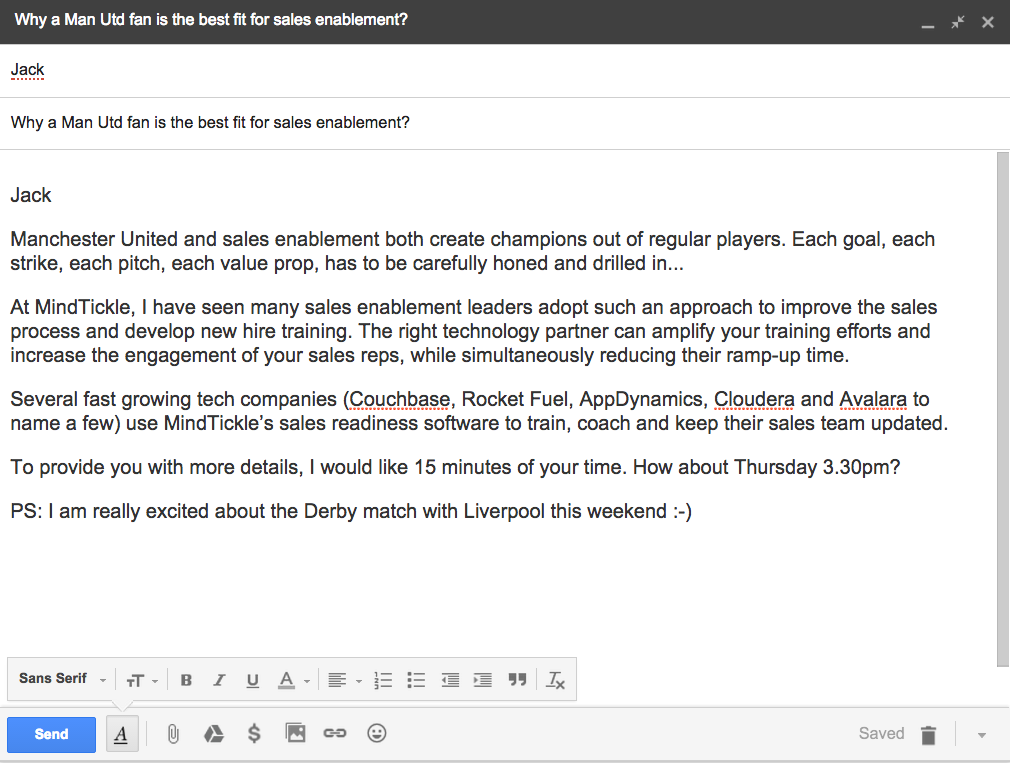Cold emails have earned a bad reputation. Prospects see them as a nuisance, and most just hit delete without even a casual read. Even when the message is highly targeted, the open rate ends up being less than 10% on average. I call it the “Rhino effect”. Most of us have developed a thick skin over the years as a result of the constant barrage of irrelevant email.
Not willing to settle for “status quo”, we worked hard to crack the code of email copy that would put a smile on our prospect’s face. Our formula was not necessarily new or unique – arouse curiosity in the subject and follow it up with a crisp and engaging body. But we pushed ourselves really hard to execute this formula to perfection.
The results of this effort were very encouraging. More than a third of the recipients of these emails choose to reply to our cold emails, and close to 10% of those have converted into solid opportunities.
Here is one of those highly personalized emails:

So, what exactly did we do?
1. Searched and Researched
The objective of our research was not just to find out about their business, but to also understand what interests the individual both professionally and personally. In this instance, we reviewed Jack’s Twitter account and learned that he was a keen Manchester United fan. We also found out from LinkedIn that he had recently been appointed as Sales Enablement Manager at a high-growth startup which had recently raised a large round of funding.
2. Mapped Individual KPIs With Their Business’ Objectives
Once we had learned about the business and the individual, we made logical assumptions and weaved them into our message. For example, as Jack’s startup had recently raised big funding, it was safe to assume that the company was experiencing very strong sales growth. As a Sales Enablement Leader, we knew that scalable expansion and shortening ramp-up time for new hires would probably be a key KPI for him.
“At MindTickle I have seen many sales enablement leaders adopt such an approach to improve the sales process and develop new hire training.”
3. Learned About The Person Not The Persona
Most people include personal information on their social media profiles. This gives us an idea of what their interests are so that we can connect with them on a personal level. In this example, we knew from Twitter that Jack liked to ‘coach’ the team by live-tweeting during matches. We leveraged this information to relate his personal interests to his professional objectives:
“Manchester United and sales enablement both create champions out of regular players. Each goal, each strike, each pitch, each value prop, has to be carefully honed and drilled in…
PS: I am also looking forward to the Derby match with Liverpool this weekend :-)”
4. Connected with a Hook That Brings A Smile To Their Face 
None of this research and copy would matter if Jack didn’t even open our email. To get his attention, we crafted a hook that would make him curious, just like we would at a networking event. In this example for instance, we connected his new role with his love of football:
“Why a Man Utd fan is the best fit for sales enablement”
As a result Jack not only opened the email, but he also gave us an opening in his calendar.
5. Empathized
Rather than jumping into a left-brain pitch of why our product is superior, we chose to paint a picture of what we can help him accomplish. We sprinkled credibility on top by calling out recognizable names of companies that had investors or locations in common with Jack’s company. Everyone needs a little reassurance even from someone they don’t know….yet.
“The right technology partner can amplify your training efforts and increase the engagement of your sales reps, while simultaneously reducing their ramp-up time.
Several fast growing tech companies (Couchbase, Rocket Fuel, AppDynamics, Cloudera and Avalara to name a few) use MindTickle’s sales readiness software to train, coach and keep their sales team updated.”
We’ve been refining these practices over the past year and our response rates have consistently improved. Even when the timing has not been right, the friendly responses to our cold emails have been heartwarming. But don’t just take my word for it, try it for yourself and watch your open and conversion rates improve out of sight too.
Guest Post by Mohit Garg, co-founder and chief customer officer of MindTickle


 Many of us lead our lives with bags of things that we believe impossible to achieve – spoons that we cannot bend. The spoon may be the aspiration to be an Olympic athlete, climb Mt Everest, run for the president’s office, or as common as a resolution to resist the urge to overeat, read a book every moth, blog regularly or make time to connect with old friends. We are often limited by our own ambition and tenacity. There is no such thing as an unattainable goal. The trick is to realize that the constraints that limit us from realizing our full potential may only exist in our mind.
Many of us lead our lives with bags of things that we believe impossible to achieve – spoons that we cannot bend. The spoon may be the aspiration to be an Olympic athlete, climb Mt Everest, run for the president’s office, or as common as a resolution to resist the urge to overeat, read a book every moth, blog regularly or make time to connect with old friends. We are often limited by our own ambition and tenacity. There is no such thing as an unattainable goal. The trick is to realize that the constraints that limit us from realizing our full potential may only exist in our mind. Let me illustrate the point with the narrative that I heard from the man himself –
Let me illustrate the point with the narrative that I heard from the man himself – 
